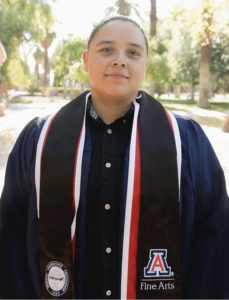Undergraduate students in Regents Professor Sama Alshaibi’s studio art class at the School of Art created a six-part podcast series based on the theme, “Migration as Practice.”
Rooted in Arizona’s Borderlands, the series, Race/Remix: Student Edition, explores the complexities of migration as a lived experience and metaphor and examines how movement shapes identity, memory and belonging.
- Stories of Migration and Absence | Cruz Ramirez-Ramos, Sylvia Bermudez, and Tucker Grams
- Histories, Futurisms, and the Reality of the Situation | Belisa Adriana Camacho and Isabella Maria Mayer
- Transit, Transmission, Transgression | Sally Wenger, Barbara Rivero, and Ben Tisdale
- Time, Migration, and Media | Elise Farmer, Scott Ewing, and Aidan Gravelle
- Unit 731 | Katherine Dusza and Megan Scherer
- Echoes of Movement | Elana Petrini, Adrianna Hernandez, and Alysa Cobb

Through a Migratory Lens
Alshaibi introduced podcasting as the final collaborative project. Not just as a new format, but as a form of artistic inquiry.
“The medium challenged students to view the world through a migratory lens, combining writing, sound, and structure, and to consider how form and content shape each other,” said Alshaibi. “The process invited students to bring their full range of experiences, perspectives, and creative strategies into dialogue with one another. Podcasting offered art students an alternative to the gallery wall—an intimate, time-based art form where sound, collaboration, and narrative became tools for making meaning together.”
Each group selected a theme drawn from the course—ecological displacement, memory and myth, language and identity—and crafted episodes that reflect their shared research and personal insights. The result is a series of podcasts that hybridize memoir and metaphor, art and scholarship, individual voice and collective experience.
The podcasters produced their series using the professional-grade audio lab in the Racial Justice Studio, giving them hands-on experience with the tools of contemporary storytelling.

The Reality of the Situation
In “Histories, Futurisms, and the Reality of the Situation” features cohosts Belisa Adriana Camacho (BFA ’25, Studio Art with a Photography, Video and Imaging emphasis) and senior Isabella Maria Mayer. The pair explore the ways immigration, family archives, and Mexican folklore converge to shape the evolving identities of a new generation of Mexican-Americans. Through a blend of historical truths and personal narratives, their podcast examines how our stories inform our sense of self, heritage, and culture.

“I myself have never migrated anywhere because I was blessed with strong ancestors who were able to do that for me,” said Camacho. “They allowed me to be born into a country that gave me inalienable rights and many privileges. I now have the responsibility to use my privileges to progress our society, so new migrants can have safe passage and be allotted those same rights and privileges.”
Building a Hyphenated Identity
Vibrant visuals and introspective narrative in the episode reflect on the realities of immigration, assimilation, and the complex process of building a hyphenated identity (specifically Mexican-American). Camacho and Mayer share how the pressure to fit into society has influenced their interpersonal relationships and collective experiences.
“I want anyone listening to remember that we all come from somewhere,” said Camacho. “The reason people come to the United States is because it is the land of opportunity. We are in desperate need of a reexamination of our societal priorities. The current political rhetoric is farming disconnection, fear, discrimination and hatred.”
Camacho said that the experience taught a new responsibility. “Even though I didn’t get the choice to be here in this country at this time, I still have a responsibility to make it a better place. I learned to take accountability for myself, my family, my history and my people and move forward in creating a more inclusive and diverse society.”
Q&A
What was the process like for you?
“My groups theme was “Transit, Transmission, Transgression” My focus was on code switching* online. My process involved lots of writing and thinking. Because we were tasked with making podcasts I thought about how podcasts highlight spoken language so why not talk about how language changes with code switching.” — Ben Tisdale
* Alternating between languages in a conversation.
“It was interesting! As a visual artist, and someone not terribly used to recording my own voice, a podcast wasn’t my first choice as far as medium. I quickly came to find however how rewarding pushing our boundaries (both as artists and as people, as highlighted in our episode) can be!” — Elise Lillian Farmer
What was your takeaway from the project?
“I learned how powerful sound is in helping us remember and feel. Even small, everyday sounds can bring back entire moments from the past.” — Elana P.
“It was interesting! As a visual artist, and someone not terribly used to recording my own voice, a podcast wasn’t my first choice as far as medium. I quickly came to find however how rewarding pushing our boundaries (both as artists and as people, as highlighted in our episode) can be!” — Elise Lillian Farmer
What would you like listeners to take away?
“I would like listeners to think more about slang and how all words have origins, some leading back hundreds of years, and others from only a year or two.” — Ben Tisdale
“I want listeners to think about how movement—through places, time, or sound—can shape who we are and help us reconnect with meaningful memories.” — Elana P.
